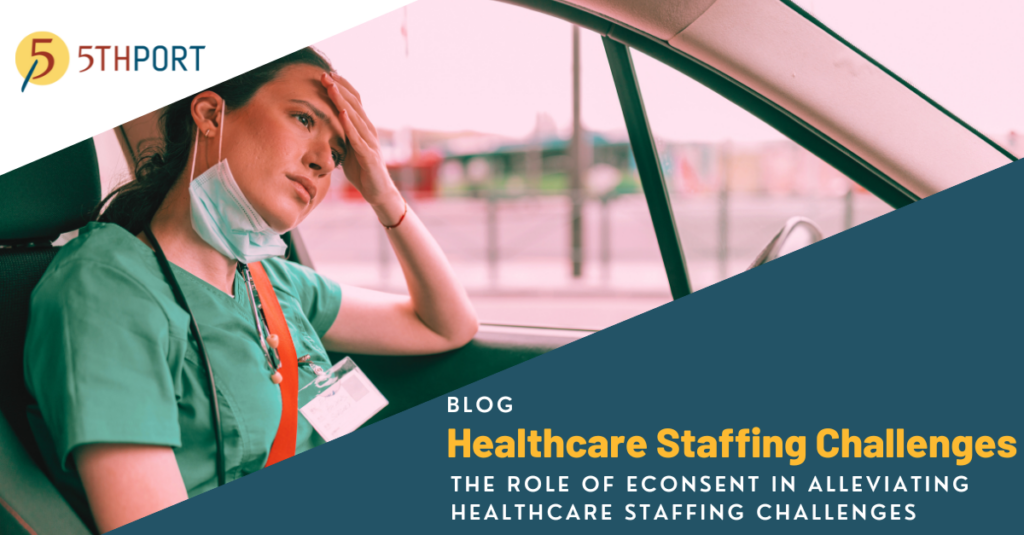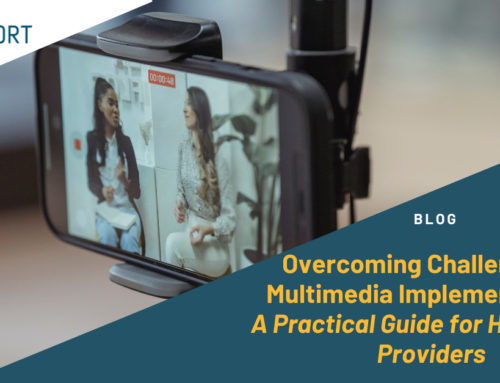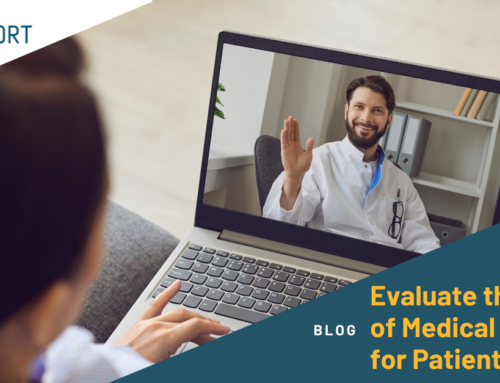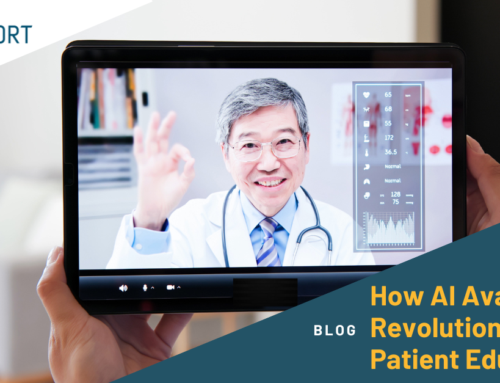The role of eConsent in alleviating healthcare staffing challenges

While the pursuit of groundbreaking medical discoveries and innovative treatments continues to thrive, there’s an underlying issue that often goes unnoticed – the burden on healthcare staff.
Although staffing challenges are rampant in every single industry vertical, healthcare staffing challenges has been hit the hardest. Some reports suggest that hospitals in major cities in the US experienced an average staffing shortage of 25% in 2022 – the worst hit being Vermont at ~65%. Healthcare staffing challenges and shortages – especially those of nurses – are expected to continue well into 2031, as the industry continues to reel from the aftermath of the COVID-19 pandemic.
Stress, increased turnover and labor costs are just a few of the factors contributing to staffing challenges. A Kaiser Family Foundation/ Washington Post poll found that ~3 in 10 healthcare workers considered leaving their profession in recent years, and about ~6 in 10 said pandemic-related stress had harmed their overall mental health.
In parallel, hospital systems are grappling with a surge in labor costs. According to Syntellis and the American Hospital Association, labor costs have increased 258% between 2019 and 2022, as hospitals were pushed into relying more heavily on contract staffing firms to keep up with patient demand.
The numbers continue to tell a staggering story: IMARC’s market overview indicates the global health and wellness market size reached a monumental $3,481.8 billion in 2022 and is expected to reach $4,454 billion by 2028. And, a recent industry report from Fortune Business Insights indicates that the global clinical trials market size is projected to grow from $57.76 billion in 2023 to $92.45 billion by 2030.
So, while the news of expanding hospitals and clinical research facilities is uplifting, existing healthcare staffing challenges mean they’re just not going to be able to keep up with increased patient demand.
Healthcare staffing Challenges, Shortages and Overwork:
The demand on healthcare and clinical research professionals has skyrocketed, with an increasing number of trials and a burgeoning number of sites and Contract Research Organizations (CROs). This influx has far outpaced the growth of the job market and the ability to hire and retain the right staff. As a result of staffing challenges, clinical trial staff find themselves particularly overburdened, overworked, and often struggling to manage their workload, particularly when it comes to patient engagement and electronic consent.
The shortage of experienced clinical trial staff and high turnover rates within the industry have created an urgent need to onboard and educate new staff quickly. This need places an additional burden on existing employees, who are already grappling with heavy workloads and staffing challenges. The situation is further compounded by the lack of a single point of truth when it comes to critical aspects of their work – patient engagement and electronic consent.
The Complexities of Patient Engagement and eConsent:
In 2021, many healthcare systems across North America transitioned from paper-based medical management to digital data management and electronic consent systems.
The adoption of Electronic Health Records (EHRs) for example, encouraged by government initiatives and regulations such as the Health Information Technology for Economic and Clinical Health Act (HITECH) and the Meaningful Use program – has been largely successful. In fact, the CDC found that office-based physicians using any EMR/EHR was 88.2% and those with a certified EMR/EHR was 77.8%.
The transition towards digital data management emerged for reasons related to improved accessibility, data security and efficiency.
However, a large chunk of critical digital data management has been largely tucked away – that which deals with patient engagement and electronic consent. These ensure that participants understand the trials they’re involved in, the risks and benefits, and their rights as research subjects – a must have from the Human Research Protection Program (HRPP’s) perspective.
But, managing these processes with disparate digital solutions that don’t speak with each other, a complicated HealthTech stack or a staunch reliance on paper can be complex, time-consuming and stressful – an inefficient process.
This leads to a big problem: lacking a single point of truth in relation to patient engagement and true informed consent.
5thPort’s patient engagement and eConsent platform – THE solution to staffing challenges
The 5thPort patient engagement software and eConsent solution is designed to address several key issues that clinical trial staff face, providing them with the support they need to navigate staffing challenges.
1. Consistency and Compliance
One of the primary benefits of 5thPort is its ability to ensure a consistent process for patient engagement and electronic consent. This eases the learning curve for staff but also ensures compliance with regulatory requirements, reducing the risk of errors or oversights.
Speaking of compliance, research shows that incomplete ICFs are one of the most common reasons for protocol deviations and are considered serious non-compliance issues. Further, Rizvi in her 2019 thesis submitted to Johns Hopkins, noted that “between the years 2015-2018, consent forms not being approved/signed/dated was the #1 frequent audit/site inspection observation.” [content (jhu.edu)] You couldn’t make a better case for implementing eConsent into your workflows.
2. Time Efficiency
A comprehensive study in 2019 showed that 78% of LARs that signed on behalf of clinical study patients preferred eConsent over a paper-based consent, allowing for better time management.
This same principle extends to actual clinical trial staff who are often short on time, juggling multiple responsibilities. The overwhelming burden of patient engagement and eConsent can significantly hamper their productivity. 5thPort enables staff to save precious time and focus on other critical aspects of their roles, enhancing their efficiency.
3. Remote Engagements reduce burnout and ease staffing challenges
Remote engagements in clinical trials offer several benefits to staff, including rapid onboarding of new staff, reduced staff burnout, consistency in participant interactions, flexibility in scheduling, and improved patient access.
By providing a standardized and efficient approach to participant engagement, 5thPort’s remote patient engagement software eases the onboarding process for new staff, ensuring that they can quickly become productive team members. This, in turn, reduces staff burnout by increasing flexibility in scheduling (for both staff and participants), and broadening patient access by removing geographical barriers, resulting in more effective and sustainable clinical trial operations.
4. Multimedia Content and Teachback
5thPort uses multi-media content and a teachback approach to enhance participant understanding. By presenting trial information in various formats, such as videos, infographics, and interactive modules like quizzes, participants are better equipped to grasp the complexities of the study.
Research supports the use of multi-media and interactive elements in healthcare. According to a 2011 study that evaluated the levels of comprehension of procedures and risks of a mock chemotherapy neuropathy trial – participants who received an ICF via a video, standard text and an interactive quiz scored 23% higher in a test than those who received the ICF in paper form alone.
5thPort’s teachback method ensures that participants can explain what they have learned, boosting the overall quality of the informed consent process.
These capabilities empower participants to take an active role in their understanding of the trial, which, in turn, lightens the staff’s workload. The combination of informed participants, reduced errors, and a streamlined consent process results in more efficient clinical trials and aids in addressing staffing shortages.
5. The Power of an Educated Participant – Alleviates Staffing Challenges
Educated participants can significantly ease the burden on clinical trial staff. When participants have a comprehensive understanding of the trial, they are more likely to adhere to protocols and report any issues or adverse events accurately. This not only saves time for staff but also improves overall trial efficiency.
Conclusion to Healthcare Staffing Challenges: A Brighter Future for Patient Engagement and eConsent
By simplifying the processes of patient engagement and eConsent, clinical trial staff can work more efficiently and stress-free while ensuring that participants are well-informed and engaged throughout the study. With 5thPort’s patient engagement software and electronic consent solution, we are not only addressing the immediate challenges of overworked staff and participant understanding but also contributing to the broader goal of advancing healthcare through research.
As the clinical trial landscape continues to evolve, eConsent solutions like 5thPort pave the way for a brighter future. They make it possible to conduct research that combines efficiency with integrity, ultimately bringing us closer to groundbreaking discoveries and improved patient outcomes.




